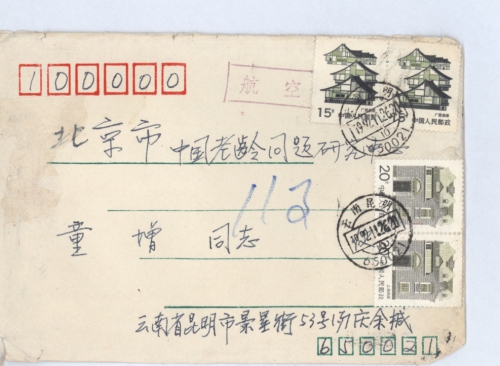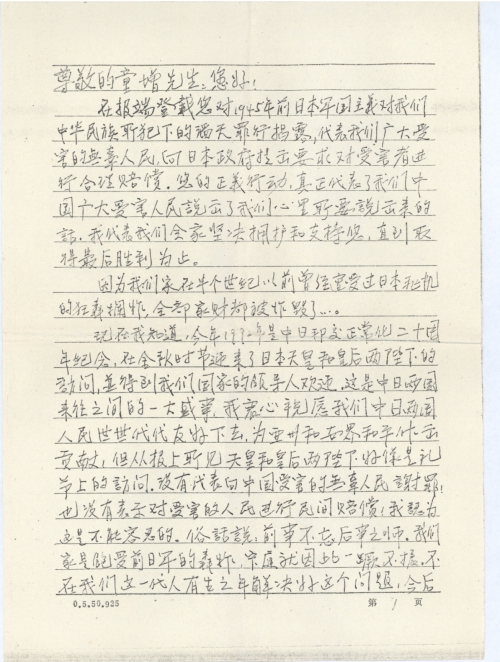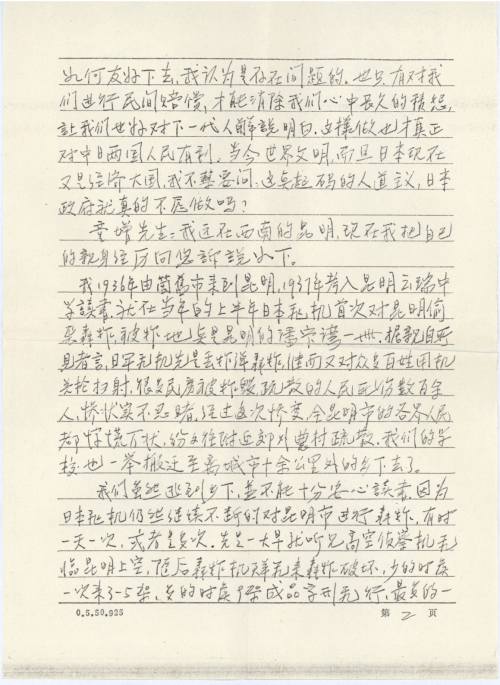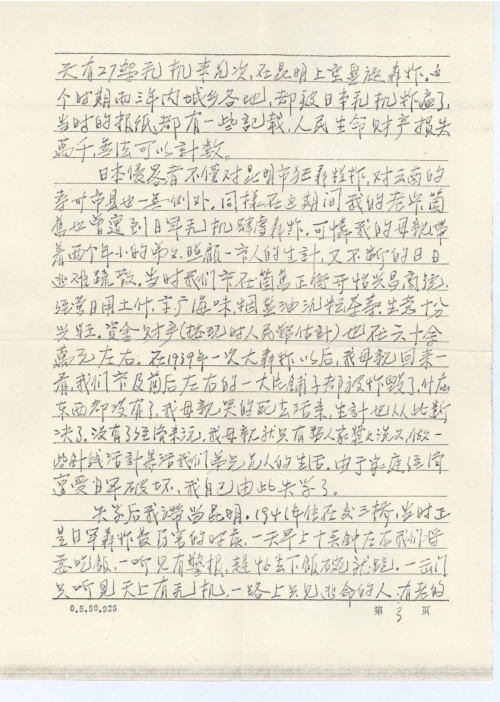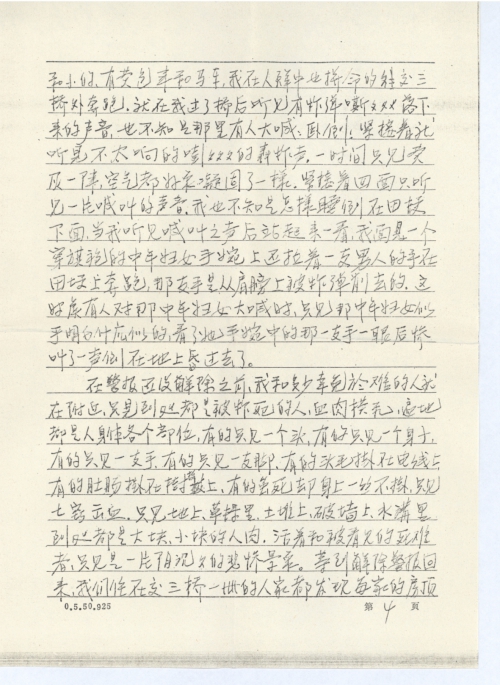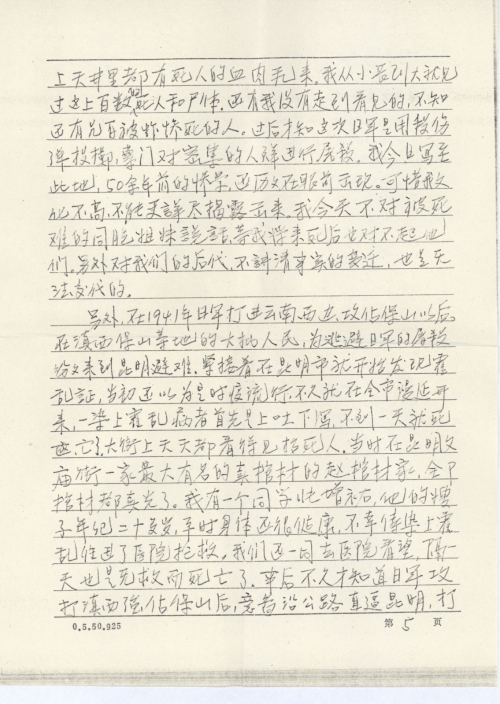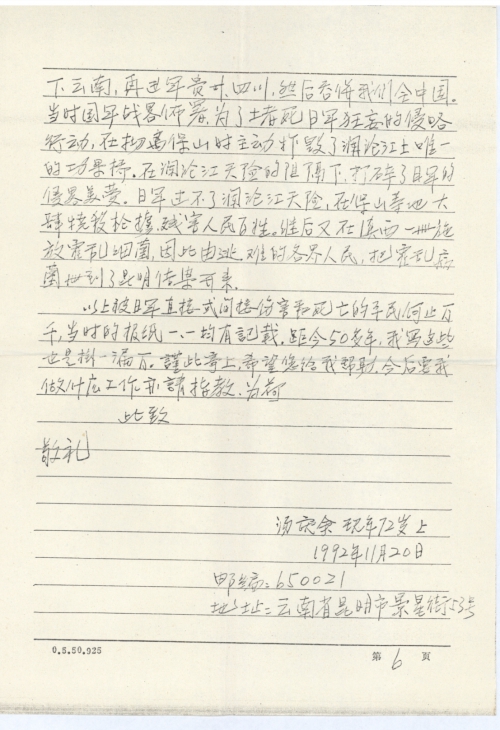Address of Author:Kunming City, Yunnan Province
Date of Event:1937
Location of Event:Kunming City, Yunnan Province
Name of Author:Tang Qingyu
Name(s) of victim(s):Common people in Kunming
Type of atrocity:Air Bombings, Biological/Chemical Warfare(AB, BC)
Other Details:In 1937 the Japanese aircrafts bombed Kunming and shot the people with machine guns, leaving countless bodies in the street. They also placed the cholera virus in Kunming, killing more than ten thousand people directly or indirectly. I hope the data will help Mr. Tong in some way.
Respected Mr. Tong Zeng:
Hello!
According to newspaper reports, you revealed the towering crimes committed by the Japanese Militarism before 1945 against our Chinese people, and represented our innocent victims to demand the Japanese government to give reasonable compensation to victims. Your righteous actions truly represent our Chinese victims, and speak out the words long pent up in our heart. On behalf of my whole family, I resolutely support you, till the moment when we score the final success.
Because half a century ago our family received bombing from Japanese aircrafts, all our family assets were destroyed….
Now I know, this year 1992 marks the 20th anniversary of the normalization of Sino-Japanese diplomatic relation. In the golden autumn season, we witnessed the visit of Japanese Emperor and Empress, who received welcome from our government officials. This is a grand event in the history between China and Japan. I sincerely wish we Chinese and Japanese people will maintain friendly relation for generations to come, and make contributions to peace in Asia and the world. But from the newspaper, I learned that the Emperor and the Empress seemed to pay a courtesy visit only, and did not offer apology to innocent victims in China! Nor did they express any intention of giving private compensation to victims! In my view, this is unbearable. As the old saying goes: The remembrance of the past is the teacher of the future. My family members are victims of bombing from the former Japanese Army, after which my family fortune began to decline. If this problem is not settled properly during the living days of our generation, I doubt if we can keep friendly relationship in the future. Only by giving compensation to the Chinese people will it be possible to remove our long-accumulated anger in the heart, and enable us to clarify things to the next generation, and only in such way will it truly benefit both Chinese and Japanese people. Now we have entered an age of global civilization and peace, and Japan is now a big economic power. I can’t help but ask, why does the Japanese government refuse to do such minimum act of humanitarianism?
Mr. Tong Zeng: I am far away now in Kunming in the remote Southwest. Let me tell you my personal experience here.
In 1936 I came to Kunming from Gejiu City, and in 1937 I enrolled into Kunming Yunrui High School. In the first half of that year Japanese aircrafts for the first time attacked and bombed Kunming. The bombing site was Panjiawan in Kunming. According to those who personally heard the bombing, the Japanese Army’s aircrafts first threw bombs, then they sprayed bullets to civilians with machine guns. Many civilian houses were destroyed, and the people being evacuated suffered several hundred casualty. The destruction scenes were too horrible to witness. After this massacre, people from all social circles in the entire Kunming were plunged into panic, and they one after another evacuated to nearby suburban villages. Our school was no exception. It was relocated to the countryside more than a dozen li away from the city center.
Although we fled to the countryside, we still could not study very peacefully. This is because Japanese aircrafts still continually bombarded Kunming city, sometimes once each day, sometimes multiple times each day. First in early morning a reconnaissance aircraft would arrive in the air above Kunming, followed by bombers which dropped bombs. Sometimes 3-5 aircrafts would come each time, and sometimes 9 aircrafts in pyramid formation would cross the sky. In one extreme case one day as many as 27 aircrafts came several times, circling Kunming in the air and dropping bombs. During this period, within two and three years, everywhere either in the city or in the countryside received bombing from Japanese aircrafts. Newspapers at that time published some articles showing that people sustained loss of life and property amounting to millions, the damage being too numerous to count.
Japanese invaders not only bombarded Kunming city, they also attacked cities and counties in Yunnan elsewhere. Similarly during this period, my hometown Gejiu also received wanton bombing from the Japanese Army’s aircrafts. My poor mother took two younger brothers, and looked after the whole family’s livelihood, while each day they were forced to evacuate to different places. Back then my family owned a Yixingchang shop on Zhengjie Street in Gejiu, selling daily local grocery, script, sugar, seafood, tobacco, salt and oil, grain, tea, etc. The business was booming, with its total capital asset (estimated according to current RMB) amounting to about 600,000 yuan. After one big bombing in 1939, my mother returned there to take a look, only to find that our home and a large tract of the shop area was all destroyed, and nothing was left. My mother cried bitterly, and since then we lost our livelihood. Without source of income, my mother had to earn money to sustain the living of our brothers by helping others do some laundry, and some needlework. Because the family financial means was destroyed by the Japanese Army, I had to drop out of the school.
After dropout, I stayed in Kunming. In 1941 when I lived at Jiaosanqiao, back then it was the period when the Japanese Army’s bombing was at its peak. One day in the morning, at around 10 o’clock, when we were ready to have lunch, suddenly the alarm went off, so we put down the rice bowl and ran out. The moment we ran outside the gate, we heard aircrafts approaching in the air. Along the way we saw other people fleeing the city, including both old and young. There were also vehicles and horse carriages. In the crowd, I desperately ran toward the outskirts of Jiaosanqiao. Just when I passed the bridge, I heard the shrieking sound of falling bombs, and someone shouted: Lie down! Then I heard not very loud explosion sound. For a moment yellow dust shrouded everything, and the air seemed as if congealed. Then I heard shouting around me, and I had no idea when I fell to the bottom of the field ridge. When I stood up after hearing the shouting, I saw a middle-aged woman dressed in cheongsam running on the field ridge while clutching a man’s hand, which was only a cut-off part of the man’s shoulder resulting from the bomb shell. At this moment, someone shouted to the middle-aged woman, then that middle-aged woman seemed to realize something. She stared at the body part with hand gripped in her hand for a moment, and cried horribly before collapsing on the ground and losing consciousness.
Before the alarm stopped, many survivors and myself were just nearby. We saw dead bodies everywhere, flesh and blood flew around, parts of human bodies littered on the ground, a head, a trunk, a hand, or a foot, some dead one’s head hanging on the tree, other’s intestines swaying on branches, some dead bodies naked. We saw blood flowing from people’s nose and mouth and big or small chunks of human flesh being everywhere on the ground, in the haystack, on the mud mound on broken walls, in water ditches. The living looked at the dead ones. It was a miserable and bleak scene. When I returned after the alarm stopped, those living at Jiaosanqiao area found that on each house’s roof, and in the courtyard, there was dead people’s flesh everywhere. As a matter of fact, I saw hundreds of dead bodies when I was at that age, but there were still others that I had not seen, maybe several hundred other dead bodies. Afterwards I learned that this time the Japanese Army used fragmentation bomb, which were specially targeted at dense crowd for slaughter purpose. When I was writing down the above words, the tragedy 50 years ago seemed to revive vividly in front of my eyes. Unfortunately, due to my poor education, I’m unable to reveal them in more details. Today if I fail to speak out on behalf of those dead compatriots, I will find it hard to give them an explanation when I die. What’s more, for my offspring, I will fail to perform my duty if I do not clarify the facts for them.
Furthermore, in 1941 when the Japanese Army invaded Western Yunnan, after Baoshan was conquered, large crowds of residents living in Baoshan and other places in Western Yunnan swarmed to Kunming to avoid being slaughtered by the Japanese Army. Immediately afterwards, cholera broke out in Kunming. At first people thought it was epidemic plague, but soon it spread to the whole city. Those contracted cholera first would have symptoms of vomiting and diarrhea, and soon they died in less than one day. On the streets people could see dead people each day. Back then at the biggest and most famous coffin shop (the boss was surnamed Zhao) on Wenmiao Street in Kunming, all the coffins were sold out. The aunt of my classmate Zhang Zengyou was only a little over 20 years old and she was usually very healthy. But unfortunately, she also was infected with cholera, and was sent into hospital for rescue. We together paid her a visit, but one day later she also died despite treatment. It was sometime later that we learned after the Japanese Army attacked Western Yunnan and occupied Baoshan, they intended to follow the highway and directly attack Kunming, occupy Yunnan, then move toward Guizhou and Sichuan, with the final aim of occupying the whole China. Back then the Nationalist Army made military deployment, in order to stop the presumptuous invasion action by the Japanese Army. When leaving Baoshan they voluntarily destroyed Gongguo Bridge, the only bridge on the Lancang River. Separated by the natural barrier of Lancang River, the Japanese Army cannot continue their invasion. Since the Japanese Army was unable to cross the Lancang River natural barrier, they burned, killed and looted in Baoshan and other places, persecuted ordinary people. Afterwards, they spread cholera bacteria in Western Yunnan, therefore the fleeing people of all social circles brought the cholera bacteria to Kunming and spread it around.
As mentioned above, the number of civilians suffering direct or indirect damage from the Japanese Army runs to thousands and millions. Newspapers published at that time all carried the stories. Now more than 50 years have passed, and what I wrote above is a reminder. I hereby mail it to you, hoping you can give me help. If you need me to do something in the future, please do not hesitate to contact me.
Regards
Yours sincerely
Tang Qingyu, now 72
November 20, 1992
Postal code: 650021
Address: 53 Jingxing Street, Kunming City, Yunnan Province














